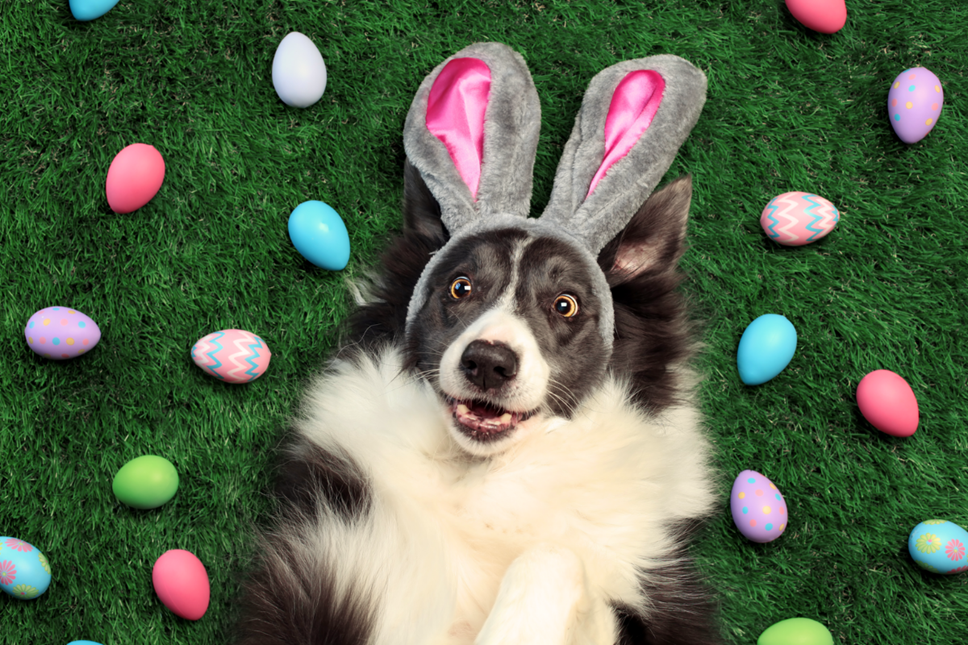
Don’t egg-nore Easter hazards, warn pet experts
Only 8 in 10 realise chocolate is toxic to dogs and cats – and so is the classic hot cross bun
Easter is a time for indulgence – but not for our furry friends, warn the experts at Go.Compare pet insurance. Many of the seasonal treats we love are dangerous to cats and dogs, and being aware of them could save you an expensive – and avoidable – trip to the vet.
With recent research revealing only 8 in 10 people (82%) realise chocolate is toxic for dogs*, Go.Compare have put together a list of the Easter treats you’ll want to keep out of reach from your pets:
- Easter chocolate – contains caffeine and theobromine, which are both dangerous to cats and dogs, and can even be fatal in large quantities.
- Hot cross buns – these contain dried fruit like currants, raisins or sultanas, which are all toxic even in very small quantities, and can even cause kidney failure.
- Simnel cake – similarly, this classic Easter bake contains dried fruit and should be kept away from pets.
- Cooked bones – if you are enjoying an Easter roast, avoid giving any cooked bones to your pets. Once cooked, bones become brittle and can splinter, possibly causing choking or damage if eaten.
- Spring bulbs and flowers – many spring bulbs and blooms are toxic to dogs, including daffodils, tulips, bluebells, rhododendrons and azaleas.
Ceri McMillan, pet expert at Go.Compare, said: “A surprising number of our favourite Easter treats are a big no-no for both cats and dogs. Many people know that chocolate is toxic when ingested, but raisins and sultanas can be deadly too – and these are a key ingredient of the seasonal favourite, the hot cross bun, as well as Simnel cake. Sharing even a small amount of these sweet treats with your pets could be deadly, as they can suffer kidney failure after ingesting just a few dried fruits or grapes.
“Cooked bones are a risk too, as they are brittle and can easily splinter, potentially hurting your pet or causing them to choke. So, if you’re enjoying a leg of lamb on Easter Sunday, don’t be tempted to give the dog a bone – no matter how hard they beg.
“If you have green fingers and are getting out in the garden with the arrival of Spring, we would also recommend keeping any spring bulbs and flowers safely out of your pets’ reach. Much-loved spring blooms like daffodils and tulips are toxic when eaten by pets, and this includes the bulbs as well as the flowers and leaves.
“If you suspect your cat or dog has eaten something they shouldn’t, don’t wait until you see symptoms – call your vet and ask their advice as soon as you can. If possible, keep any packaging and write down details of what you think your pet has ingested and when, as this will help your vet decide the best course of action.
“Finally, check you have adequate pet insurance in place. Policies vary a lot in terms of the level of cover they provide, so it’s important to take the time to compare the options available. Use a comparison site to benchmark policies against each other and choose the option that suits you and your pet best.”
For more information about household dangers to your best, visit: https://www.gocompare.com/pet-insurance/household-dangers-for-your-pets/.
-Ends-
Contact Information
Rosie Johns
Notes to editors
*Data Source: On 9th-12th December 2022, an online survey of 2,000 randomly selected Great British adults was executed by Maru/Blue. For comparison purposes, a probability sample of this size has an estimated margin of error (which measures sampling variability) of +/- 2.1%. The results have been weighted by age, gender, region and social grade to match the population, according to Census data. This is to ensure the sample is representative of the entire adult population of Great Britain. Discrepancies in or between totals are due to rounding.
For further information please contact:
Lynsey Walden or Kath Chadwick at Go.Compare on lynsey.walden@gocompare.com or kathryn.chadwick@gocompare.com.
Keep up-to-date with Go.Compare on Twitter; @GoCompare
Notes to editors
About Go.Compare
Go.Compare is a comparison website that enables people to compare the costs and features of a wide variety of insurance policies, financial products and energy tariffs.
It does not charge people to use its services and does not accept advertising or sponsored listings, so all product comparisons are unbiased. Go.Compare makes its money through fees paid by the providers of products that appear on its various comparison services when a customer buys through the site.
When it launched in 2006, it was the first comparison site to focus on displaying policy details rather than just listing prices, with the aim of helping people to make better-informed decisions when buying their insurance. It is this approach to comparing products that secured the company an invitation to join the British Insurance Brokers’ Association (BIBA) in 2008, and it is still the only comparison site to be a member of this organisation.
Go.Compare has remained dedicated to helping people choose the most appropriate products rather than just the cheapest and works with Defaqto, the independent financial researcher, to integrate additional policy information into a number of its insurance comparison services. This allows people to compare up to an extra 30 features of cover.
Go.Compare is part of Future Plc and is authorised and regulated by the Financial Conduct Authority (FCA).
More information can be found here www.gocompare.com or here https://www.futureplc.com/brands/.
